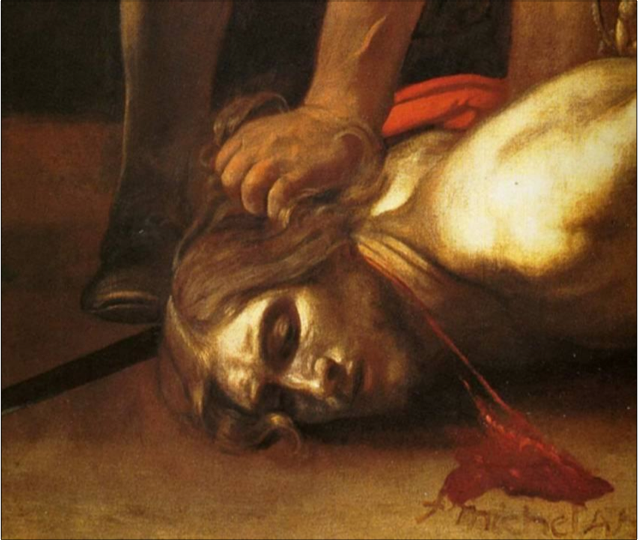John, the bold and austere accuser of the lawless.

The Beheading of St. John the Baptist (detail), Caravaggio, ARSH 1608, Co-Cathedral of St. John, Valletta, Malta
Today is the Feast of the Beheading of St. John the Baptist. There has been a tradition of full-fasting on this day in grief for the death of a man that Our Lord and Savior said, “There is not a greater prophet.”
A moving reading on St. John the Baptist:
…This divine Prophet, after he had preached the baptism of repentance according to God’s command; had taught men of low rank and high how they must order their lives; had admonished those whom he baptized and had filled them with the fear of God, teaching them that no one is able to escape the wrath to come if he do not works worthy of repentance; had, through such preaching, prepared their hearts to receive the evangelical teachings of the Savior; and finally, after he had pointed out to the people the very Savior, and said, “Behold the Lamb of God, Which taketh away the sin of the world” (Luke 3:2-18; John 1: 29-36), after all this, John sealed with his own blood the truth of his words and was made a sacred victim for the divine Lawat the hands of a transgressor.
This was Herod Antipas, the Tetrarch of Galilee, the son of Herod the Great. This man had a lawful wife, the daughter of Arethas (or Aretas), the King of Arabia (that is, Arabia Petraea, which had the famous Nabatean stone city of Petra as its capital. This is the Aretas mentioned by Saint Paul in II Cor. 11:32). Without any cause, and against every commandment of the Law, he put her away and took to himself Herodias, the wife of his deceased brother Philip, to whom Herodias had borne a daughter, Salome. He would not desist from this unlawful union even when John, the preacher of repentance, the bold and austere accuser of the lawless, censured him and told him, “It is not lawful for thee to have thy brother’s wife” (Mark 6: 18). Thus Herod, besides his other unholy acts, added yet this, that he apprehended John and shut him in prison; and perhaps he would have killed him straightway, had he not feared the people, who had extreme reverence for John. Certainly, in the beginning, he himself had great reverence for this just and holy man. But finally, being pierced with the sting of a mad lust for the woman Herodias, he laid his defiled hands on the teacher of purity on the very day he was celebrating his birthday. When Salome, Herodias’ daughter, had danced in order to please him and those who were supping with him, he promised her — with an oath more foolish than any foolishness — that he would give her anything she asked, even unto the half of his kingdom. And she, consulting with her mother, straightway asked for the head of John the Baptist in a charger. Hence this transgressor of the Law, preferring his lawless oath above the precepts of the Law,fulfilled this godless promise and filled his loathsome banquet with the blood of the Prophet. So it was that that all-venerable head, revered by the Angels, was given as a prize for an abominable dance, and became the plaything of the dissolute daughter of a debauched mother.
This dovetails with a quote from St. Augustine, whose feast was yesterday:
“What is reprehensible, however, is that, while leading good lives themselves and abhorring those of wicked men, some, fearing to offend, shut their eyes to evil deeds instead of condemning them and pointing out their malice. To be sure, the motive behind their tolerance is that they may suffer no hurt in the possession of those temporal goods which virtuous and blameless men may lawfully enjoy; still, there is more self-seeking here than becomes men who are true sojourners in this world and who profess the hope of a home in heaven.”
-St. Augustine of Hippo, City of God, Book 1
St. John the Baptist, pray for us.
Christ, have mercy on us.
